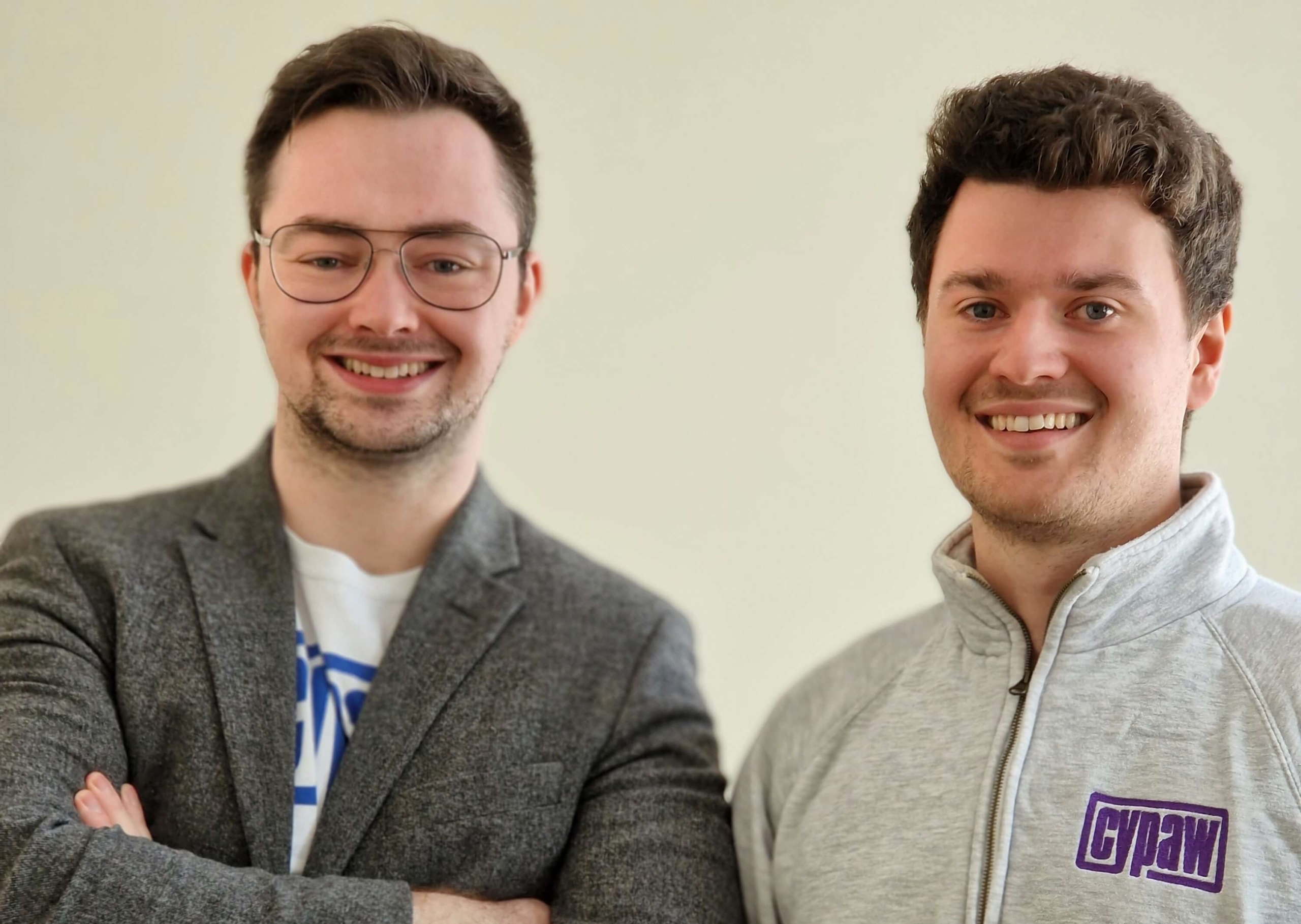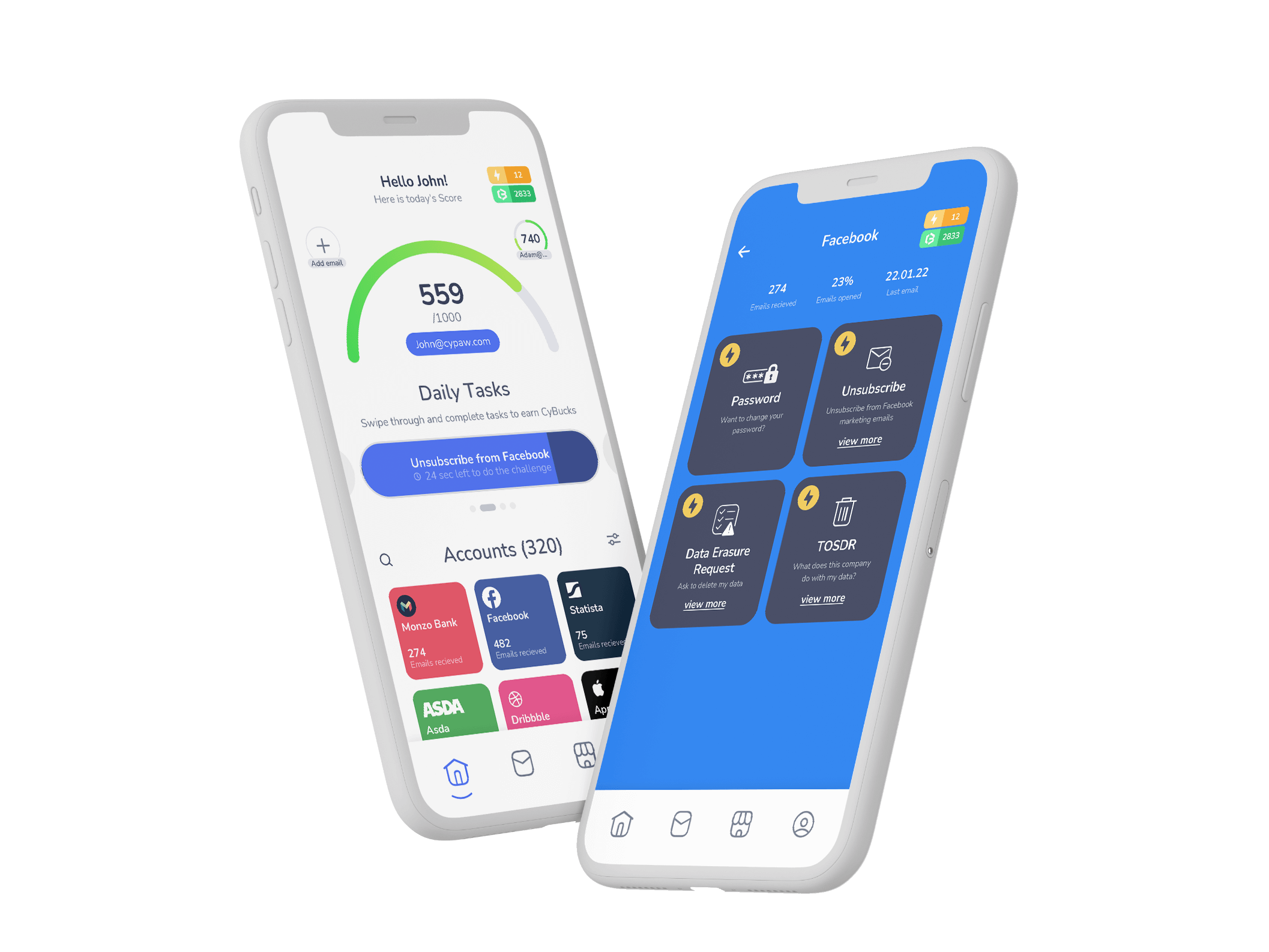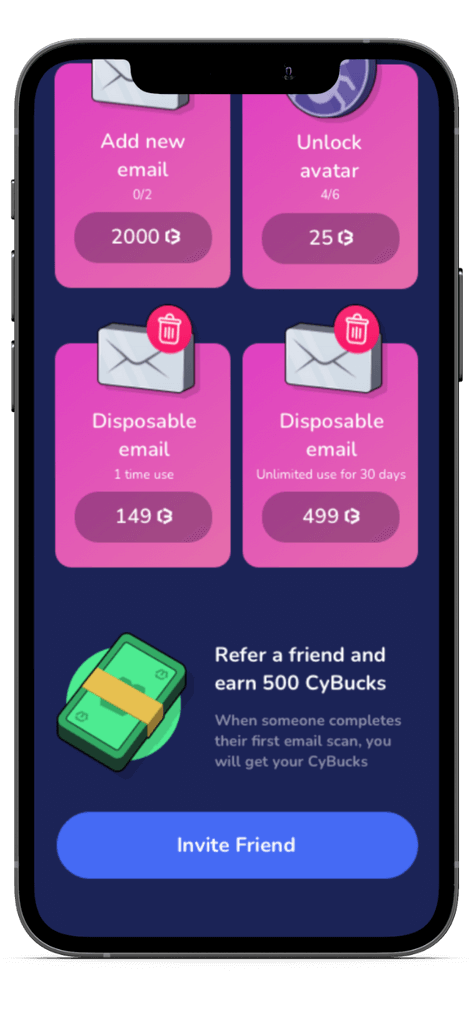Meet Cypaw: the mobile app that easily finds and deletes your online accounts
Today it is our pleasure to present a new startup from the StartupYard program. Cypaw is smart mobile app that takes care of your privacy and online data. We sat down with Adam Pritchard and Ryan Bosley the co-founders of Cypaw to talk more about what they do and their plans for the future.
Hi Adam and Ryan, tell us a bit about your personal journey towards founding Cypaw. How did you get here?
Adam: I’ve had an interest in online privacy and security from an early age but it was only after spending some time working in the industry did I see a problem with what was being offered. Very quickly I saw that the Cyber and Privacy markets were exclusively targeting people who were already aware of the problem and knew what they were doing. On top of that, the solutions on offer had a heavy focus on the hardware side of the equation, often skipping the human element. Unfortunately, it is this human element that often can be the downfall of any security or privacy solution. This is where the concept of Cypaw was born – a platform that could be used by any internet user, not just the technologically advanced, and focuses on helping people rather than improving the existing technology.
Ryan: I have always been passionate about new tech and an advocate for online privacy. After university, I spent several years working in sales and customer relations, here I acquired some great skills in how best to engage with customers and how to sell to them. Adam and I have known each other since childhood and he was already working on the initial concept of Cypaw when he reached out to me asking if I wanted to help.

The Cypaw Founders – Adam and Ryan
Adam: In the very early stages of Cypaw, we focussed on the B2B market by creating a platform that allows employees to understand their digital footprint, educate themselves, and reduce the risk of them being in a data breach. The upside to the business is that 90% of data breaches they suffer often start with an employee being targeted. Be it ransomware or data theft, the point of entry is often a phishing email. Through customer feedback, we discovered that businesses were unwilling to sign up their employees on a larger scale and buy the platform, but they had a great interest in using it for themselves. This prompted larger research, which led to the conclusion that customers found it interesting for their business, but would love to use it themselves. We kept the backend, transformed the front end from a web app to a mobile app, and Cypaw as we know it today was born.
What do you think is the biggest problem right now in the data privacy market, and how does Cypaw help solve that issue?
Adam: The number one problem in the privacy market is apathy, followed closely by not knowing what to do. Our market is a wide audience, and while they know they should care about privacy, they don’t know how to start. This is a problem as if you don’t act, companies will often take advantage of compliance and take as much valuable information as they can get. This leaves people open to invasive technology, but also at an increased risk of being in a data breach. The more information that is spread online, the higher the chance that some hacker gets their hands on it.
Ryan: I completely agree. I am starting to see more people take an active interest in their data privacy but as Adam said, the everyday internet user is not aware of how or where to start. This is why we created Cypaw, as an app that allows people to easily start their journey to understanding how widespread their personal data is online and to take action towards mitigating these risks.
Adam: Cypaw tackles this by making it as easy as possible to understand where your data is and incentivises you to complete small, accessible privacy actions. People are often shocked when they see how many companies have their data, and this prompts action as it’s typically 3x as many as they expect.
Incentification is important as this increases engagement after that initial shock factor has worn off. Currently, this is achieved by rewarding users with an in-app currency that can be spent on premium features that have instant use and gratification.
Let’s talk more about your products. What would you say distinguishes you from other privacy solutions? What is your “killer app?”
Ryan: What really sets Cypaw apart from the competition is our account discovery feature. This shows users what online accounts they have signed up for over the years with their email addresses and allows them to take action towards managing these accounts. Here users can send erasure requests to have their information deleted, unsubscribe from spam emails, change passwords for accounts they still need access to, and view a full breakdown of the terms and conditions they agreed to when creating an account – this can be vital for deciding if you want to keep an account or not.
Adam: Our account discovery feature offers users control over their data privacy that no other solutions are offering currently. This is what sets us apart from our competitors, as most companies are just focusing on single elements of privacy. Cypaw has a clear focus on providing a broad understanding and management of individuals’ digital footprint. Cypaw removes the confusion, by providing simple personalised tasks, sorted by priority, allowing automated account deletion or management. It’s never been easier to understand who has your data, what they do with your data, and how to delete it.

The Cypaw Homescreen and Accounts Feature
What have been your team’s biggest personal or professional challenges in making this project a reality?
Adam: We started our transition to a mobile app during the height of the COVID-19 pandemic which certainly added some difficulties. Transitioning from working in the office to purely remotely had a learning curve in time management and idea flow but via experimentation, this is something we adjusted to quickly. One of the worst ideas I had was to set up a day-long call (this was before Slack introduced Huddles) so that people could simulate working in the office by being able to talk to each other freely. This only lasted a week before it was quickly dropped due to being incredibly unpopular.
The other main challenge that we faced was getting up to speed with App Store Optimization (ASO) as this is something that we had no prior experience with and is very important for launching a successful mobile application. We had to take some time to educate ourselves on the best practices and strategies but this has paid off as our organic traffic is strong.
Ryan: As well as these personal challenges, we have had to work hard on building trust with our users. Trust does not come easy for a company people may not have heard of before. Understandably, anyone would be hesitant to allow a company they have never heard of to access their personal data. To overcome this hurdle we have focused on being completely transparent with our users as to what we need access to and why we need that access. For example, as a company we have decided to never sell user data as we believe this goes against the whole point of being a privacy focused company. Updating our messaging on our website and socials was vital to help educate any users who may be unsure about trusting Cypaw.
Who is the ideal customer for Cypaw? What do people need to get started with Cypaw?
Adam: Our customer base is a very broad audience but ideally, they are someone who understands the need to increase their online privacy but doesn’t know where to start. People who are already educated on the importance of digital privacy will be very quick to see the value of Cypaw as we make the process of finding and deleting data easy and fast. Right now, all that is required to get started is to have access to the Apple App Store or the Google Play Store and to have a Google or Microsoft email account.
Ryan: Currently, the typical demographic we are seeing use Cypaw is Millenials that are highlight active online. A survey by Cisco showed that 32% of a sample of Gen Z and Millenials would classify themselves as privacy actives – these are individuals that are actively invested in understanding and acting on their personal data privacy. This seems to be the market that we have found interacting mostly with Cypaw.
Is Cypaw available now? What do people need to get started with your service?
Ryan: Yes, Cypaw is currently available and can be downloaded entirely for free on the Apple App Store and the Google Play Store. The only requirement beyond this is to have a Google or a Microsoft email address to make the most of the app.
We have just released a brand new update for the app focusing on improving some of our core features and making the app more user-friendly. The update includes the addition of our in-app currency, Cybucks! Users can earn Cybucks for free by completing recommended daily tasks, or they can be purchased in the shop. Cybucks can be used to unlock features within the app and put towards extra energy to spend on account actions like sending a data erasure request or unsubscribing from spam emails.

The Cypaw Shop
What do you hope that Cypaw will be able to do for its users in the next few years that they can’t do now?
Adam: Our ambition is to create the sole platform, whether that’s on mobile or desktop, that users would need to understand where their data is across the internet, what risk they’re exposed to, and how to manage it. This will entail expanding our current email providers from Google and Microsoft to all popular email services, but also allow users to input their own private mail servers. It would also mean opening up to more data sources so that once we know where a user has an account, we can also cross-check that account URL with threat intelligence feeds to understand the risk associated with it.
Currently, we are giving our users the ability to manually send Erasure Requests to companies, this puts the user in the firm position as the Data Controller and ourselves as a Processor (in the eyes of GDPR) – in the future, we would like to be able to expand our actions so that we can act on behalf of users automatically. For example, if you know you are going to use a website only once, you could save a setting that means Cypaw would automatically delete that account/your data with that account after a certain period of time. Entirely handling this on behalf of users provides complete peace of mind, and the ability to set up complex routines to manage their online life, without the chore of manually doing it.
Ryan: We want Cypaw to be an app that anyone can feel comfortable using and feel like they are benefiting from. Looking to the future automation is the key to making this process as easy as possible for the user.
Has there been a major surprise for you since joining the StartupYard program? Did you learn something you weren’t expecting?
Adam: When we started with StartupYard, we were aware that we had room for improvement with some of our metrics (retention being the main one) but it wasn’t until we sat down with Cedric did we realise the full extent of what was happening. We had become engrossed in the daily tasks, putting out fires and running the company that we had lost sight of what was happening on the macro scale. Having a fresh set of eyes to review every metric, feature, and decision we had was at first a little daunting but it was critical for the process. Since then we’ve made leaps and bounds, understanding the larger picture and improving our metrics.
What was the most valuable advice you got during the StartupYard program? Why was it so helpful for you?
Ryan: One of the best pieces of advice I received during the program was to focus on one thing and execute that perfectly. My goal for Cypaw has always been for it to be a one-stop-shop for our users. However, focusing on just adding new feature after new feature can really distract you from working on improving the core functionality of the app. I could easily get carried away by trying to build out as many new features as possible for Cypaw but the advice to focus on doing one thing really well has helped me not get too distracted. I hadn’t heard of the 80/20 rule before, the concept that you can capture 80% of your market with just 20% of your features. Understanding this has really helped me bring an increased focus onto our core functionality of Account discovery and management.



